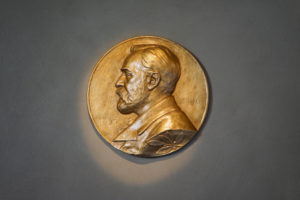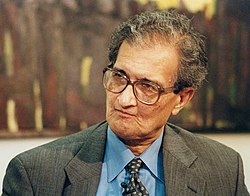
Amartya Sen
1933-

In 1998, Amartya Sen received the Nobel Prize “for his contributions to welfare economics.” Much of Sen’s early work was on issues raised by kenneth arrow’s “impossibility theorem.” Arrow had shown, much more generally than Condorcet had in 1785, that majority rules often lead to intransitivities. A majority may prefer a to b and b to c, but it does not follow, as it does for an individual, that the majority prefers a to c (see public choice). If the majority prefers c to a, then there is an intransitivity. With coauthor Prasanta Pattanaik, Sen specified certain conditions that eliminate intransitivities. He did later work on his own that resulted in a 1970 book that added to Arrow’s initial insights. One major theme was his skepticism about utilitarianism. The Nobel committee cited this work in awarding the prize.
Sen also pointed out that the standard measure of poverty in a society, the proportion of people who are below a poverty line, leaves out an important datum: the degree of poverty among the poor. He came up with a more complicated index to measure not only poverty but also its degree.
Sen studied famines in various parts of the world and pointed out that they sometimes occurred even when there was no decline in food output. Some famines occurred when the real income of specific groups fell so that these groups could no longer afford to buy food. In such cases, most economists would advocate giving money to such people so that they could buy food and make their own trade-offs between food and other things. Along with coauthor Jean Drèze, Sen, though no strong believer in economic freedom, defended this standard economist’s view and argued mildly against price controls on food because such controls would reduce the amount of food produced.
Sen was a moderate defender of free markets who sometimes put the moderate case brilliantly. He wrote:
To be generically against markets would be as odd as being generically against conversations between people (even though some conversations are clearly foul and cause problems for others—or even for the conversationalists themselves.) The freedom to exchange words, goods or gifts doesn’t need defensive justification in terms of their favorable but distant effects; they are a part of the way human beings in society live and interact with each other (unless stopped by regulation or fiat).1
Sen also wrote articles in 1990 and 1992 in which he argued that there were 100 million fewer females in China, India, and other Asian countries than there should have been. He assumed, reasonably, that this was because of discrimination against women by men and by governments. Many wondered if the Chinese government’s one-child policy (which encouraged abortion when the expectant mother thought she was having a girl) might be one of the culprits behind this “missing women” phenomenon. More recent research, though, has found that about half of the female undercount can be explained without resort to female mortality. It turns out that women who are carriers of hepatitis B tend to have more boys than girls, and that the incidence of hepatitis B is high in these Asian countries.2
Sen was born in India. He completed his early academic education there and earned his doctorate from Cambridge in 1959. He was a professor at the University of Delhi from 1963 to 1971, at the London School of Economics from 1971 to 1977, at All Souls College in Oxford from 1977 to 1988, and at Harvard University from 1989 to 1997. He is now Master of Trinity College at Cambridge University.
About the Author
David R. Henderson is the editor of The Concise Encyclopedia of Economics. He is also an emeritus professor of economics with the Naval Postgraduate School and a research fellow with the Hoover Institution at Stanford University. He earned his Ph.D. in economics at UCLA.
Selected Works
Footnotes
Related Entries
Related Links
Pedro Schwartz, The Poverty of Social Choice, at Econlib, November 2, 2015.
Pedro Schwartz, Poverty and Inequality, at Econlib, April 7, 2014.
Jagdish Bhagwati on India, an EconTalk podcast, August 19, 2013.
Marth Nussbaum on Creating Capabilities and GDP, an EconTalk podcast, September 29, 2014.
Amit Varma, Profit’s No Longer a Dirty Word: The Transformation of India, at Econlib, February 4, 2008.
